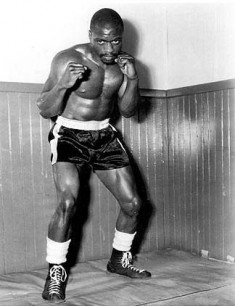| Rubin Carter | |
|---|---|
 |
|
| Boxer | |
| Born | May 6, 1937 Clifton, New Jersey |
| Nationality | American |
Rubin Carter is a famous American middleweight boxer. Apart from having a successful boxing career, Carter has also had his own fair share of controversies. In 1966, he was arrested for a triple homicide in a bar in Paterson, New Jersey. He served a prison sentence for almost two decades. During the mid-1970s, his case became a cause for several civil rights leaders, entertainers, and politicians.
Early Years
Rubin was born on May 6, 1937, in Clifton, New Jersey, but he grew up in Paterson. At the age of 12, he was arrested for attacking a man with a knife and he was sent to Jamesburg State Home for boys. Rubin claimed this man was a pedophile who was attempting to molest one of his friends. He escaped from the home before his six-year term was up. In 1954, he joined the Army and served in a segregated corps. This is where he started training to become a boxer.
Early Boxing Career
Rubin Carter won two European lightweight championships. In 1956, he returned to Paterson hoping to become a professional boxer, but he was arrested by police and forced to serve his remaining sentence of 10 months in a state reformatory.
In 1957, Rubin was arrested again for snatching a purse. He ended up spending four years in prison for that offense. After he was released, he channeled his anger towards his situation into boxing. In 1961, he turned professional. He started an amazing four-fight winning streak, which included two knockouts. Within a short while, he got the nickname “Hurricane” and became one of the top contenders for the world middleweight title.
In December of 1963, Carter defeated Emile Griffith, the welterweight world champion, in the first round of their bout. In December of 1964, he beat Joey Giardello and this was regarded as a good bet to win his next title bout.
Arrested for Triple Homicide
 Rubin Carter was never friends with the police. This was especially true during the summer of 1964 when he was quoted in the newspaper expressing anger towards the police. His flamboyant lifestyle and juvenile record angered the authorities.
Rubin Carter was never friends with the police. This was especially true during the summer of 1964 when he was quoted in the newspaper expressing anger towards the police. His flamboyant lifestyle and juvenile record angered the authorities.
Rubin was training for his next shot at the world middleweight title in October of 1966. However, he was arrested for the June 17 murder of three patrons in Paterson. He was arrested for the crime along with John Artis after an eyewitness description of killers was given to the police. However, Rubin and his friend were cleared by a grand jury when a surviving victim failed to identify them as the attackers.
The investigations still went on and on June 29, 1967, Rubin and Artis were convicted of the triple murder and sentenced to three life terms in prison. While in prison, Carter still maintained his innocence by refusing to wear an inmate’s uniform. He spent his time reading and studying and in 1974, he published his autobiography.
Trial and Support
The story of Rubin’s plight attracted the attention and support of many people. Bob Dylan visited him in prison and wrote the song Hurricane based on his troubles. Muhammad Ali and other figures including politicians, entertainers, and civil rights activists also joined this fight to free Carter.
In 1974, the two witnesses recanted their testimonies, saying they had lied. Two years later, an incriminating tape of the police interview with the two witnesses surfaced and The New York Times ran an expose about the case. Later on, a New Jersey court ruled 7-0 to overturn Carter’s and Artis’s convictions. They were released for only six months and then arrested again.
Life in Prison
In prison, Rubin Carter learned to recognize the need to resign himself to the reality of his situation. Rubin spent his time reading and studying with very little contact with others. During his first 10 years in prison, his wife, Mae Thelma, stopped visiting him and the couple eventually divorced in 1984.
In 1980, Rubin developed a relationship with Lesra Martin, a teenage boy who had read Carter’s autobiography and initiated a correspondence. Martin and his friends developed a strong bond with Rubin Carter and started to work for his release. After the summer of 1983, their efforts intensified and they started to work in New York with Rubin’s legal defense team.
Life after Prison
On November 7, 1985, Rubin was freed. After his release, he moved to Toronto, Canada. Here, he worked on his book entitled Lazarus and the Hurricane: The Freeing of Rubin “Hurricane” Carter. The book was published in 1991.
In 1993, Rubin Carter was given an honorary championship title belt.